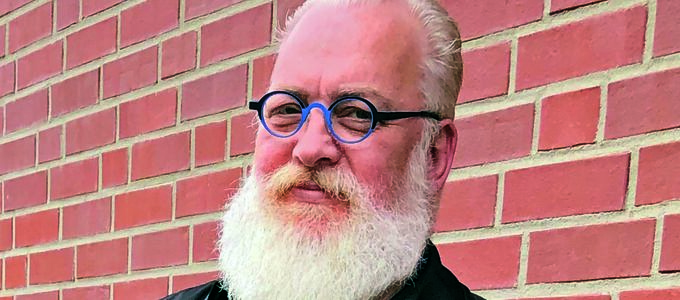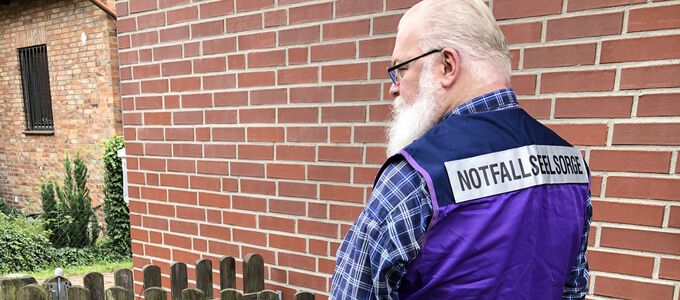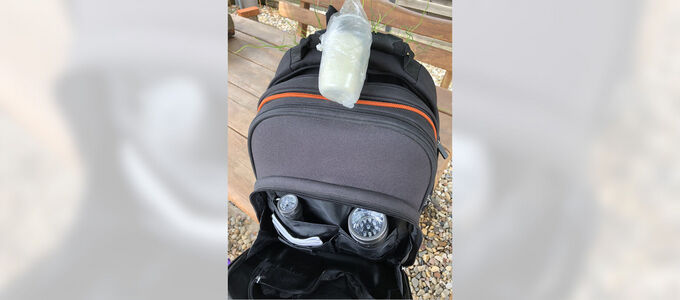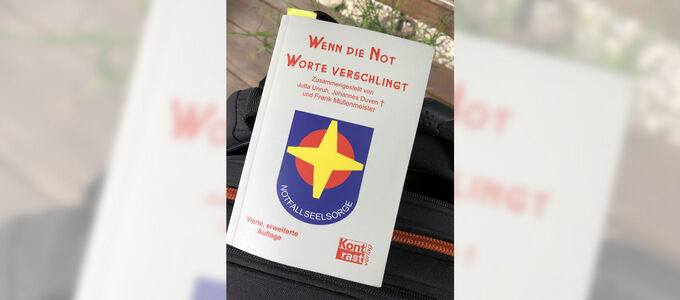He comes in an emergency
Wolfgang Lütge is an emergency chaplain in the Hanover region in Germany. In the interview, he talks about his experiences and what he finds hard about his job. He also explains why we should all show more consideration for one another.
You have been active in outpatient hospice care for fifteen years and as an emergency chaplain for eight years. How did you become involved in hospice care and working as an emergency chaplain?
Fifteen years ago I saw an advert from a social services centre in Burgdorf in the newspaper. They were looking for volunteers to help with pastoral counselling in hospices. So I applied although I didn’t know what qualifications I would need or what professional training I should have.
And how did you get involved in crisis response?
I was approached by the social service centre. They were looking for volunteers. They asked me if I could imagine working as an emergency chaplain.
What happened next?
This was then followed by an interview with the superintendent. He is the leading clergyman in a church district. He knew I was New Apostolic and was very worried that I would try and convert people. He made me promise that I would not do that. After the interview with the superintendent, I took a two-week course in an adult education centre in Hermannsburg, which is an institution of the Protestant Church in the Lüneburg Heath.
After your training, you started working in emergency pastoral care. How are you assigned to cases? How does it work?
We volunteers sign up for a duty roster. At the times listed, the rescue control centre will contact us on our private mobile phones if something comes up. When I am called, I am told, for example, that there has been a suicide or someone has suddenly died in an accident, say. I then drive to the bereaved family, either with the police or alone, and inform the next of kin of their loved one’s death. When I am with the bereaved, I try to be there for them. I take a candle with me and light it together with the next of kin. It’s like a ritual. Rituals help and sometimes I also say the Lord’s Prayer, if the person doesn’t mind. It has a calming effect.
What does your emergency kit contain?
My equipment includes an emergency backpack with a list of contact details for the various pastors I can call. My backpack also contains a lighter and a torch because sometimes I have to walk along a railway embankment. And I have small cuddly toys, still in their original packaging, which are quite good for distracting smaller children. I also always have a pack of cigarettes with me. I don’t smoke, but sometimes people want to have a cigarette to help them calm down. Sometimes I even have to use the backpack to protect the people I have come to help. For example, one woman, after I had given her the news of her husband’s death, started banging her head against the wall. I held the backpack between her and the wall. My backpack also contains a purple waistcoat that has “emergency chaplain” written on the back. I don’t put it on when I visit the bereaved at their home, of course, but I do wear it when I am at the scene of a motor vehicle accident, for example, with the fire brigade and the police present. If there is an incident that does not require the police, I always report directly to the incident commander of the fire brigade. The waistcoat identifies me as a first responder right away.
Do you also provide pastoral support for the emergency response teams after such an incident?
Yes, because first responders sometimes see extreme things. I always go back to the fire station after an incident to provide pastoral counselling to the first responders.
You just spoke about the fact that the emergency services see traumatic things in their work. How do you manage to cope with what you see yourself?
In emergency counselling, that which has been experienced can be reworked if the emergency chaplain feels that it is too much of a burden for him or her to handle. There is a centre for this in Hanover, where the Protestant Church coordinates ongoing training and psychological support for counsellors. Counsellors here have the opportunity to be monitored by a psychotherapist.
Do you link pastoral care for the bereaved with emergency pastoral care?
Yes, absolutely! Many people have absolutely no support. They fall into a big black hole after they have received the news that a loved one has suddenly died, and sometimes they even need professional help. They should actually go for psychotherapy. But sometimes I get the impression that all that matters is bigger, better, further. Maybe we can see Covid as an opportunity in this respect: it has taught us to look out for one another more and not to be so indifferent to everything that is happening around us. We should really care about the person next door, our fellow human beings. I think we should seize this opportunity and become kinder, more caring, more compassionate towards each other.
A longer version of this interview was published in the German Yearbook 2021.
Article info
Author:
Date:
Keywords:
Tatjana Fröhlich
07.09.2023
Social commitment,
People/Personalities



















